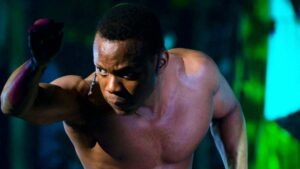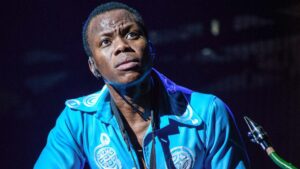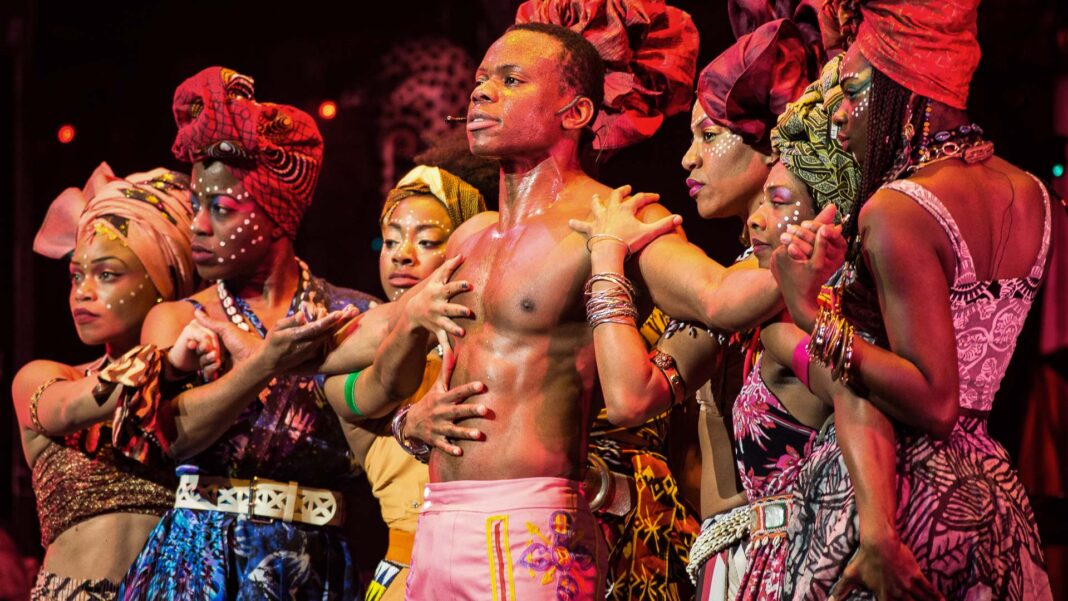
Do you know the Afrobeat music of Nigerian artist Fela Kuti? He was a very spiritual and very political singer/songwriter who ran afoul of the government. He created amazing music. He had 27 wives (whom he married all at once). He died of AIDS in 1997. The combination of all these details makes for a great story and it made for a great musical, appropriately named Fela! Duain Richmond is one of several men who have played Kuti in the musical.
Richmond, nearly ten years after last playing Kuti in the musical, is once again portraying him in Fela! The Concert which will be performed on Saturday night at The Soraya in Northridge.
He was born in Sierra Leone in Western Africa and moved to Atlanta which is where he began his pursuit of acting with the strong encouragement of his acting coach, Freddie Hendricks.
Richmond’s journey with Fela! began when he was cast as the Fela-alternate for the touring production of the musical. Even on Broadway they had a Fela alternate because of the demands of the role. When the show returned to Broadway for a brief run in 2012, Richmond was a member of the ensemble and, once again, the alternate (for his cousin Sahr Ngaujah who received a Tony nomination for his performance in the original run).
Earlier this week I spoke with Richmond about his passion for Fela Kuti, the power of Kuti’s music in the face of extreme pressure from the Nigerian government and what his music has to say to us today. What follows are excerpts from our conversation that have been edited for length and clarity. To see the full interview, please go to our YouTube channel.
In May of 2022 you posted on your Instagram account, “My love for theater is unmatched. This form of expressive art will forever be my 1st love.” Why do you feel that passionately about theater and how is that love fulfilled by playing Fela Kuti?
When it comes to Fela Kuti, Fela was a very spiritual human being. Fela always practiced spirituality with the Yoruba religion. He also believed that art, particularly music, was a weapon, was a spiritual thing. He had an interview once when he said, “Music is a spiritual weapon. You should never play with music. And those who play with music will die young.” So he believed that music was such a powerful weapon that whenever a human being was gifted with the power of arts or gifted with the power of music, it should never be taken lightly. So as him being that spiritual person that he was, his music carried that spirituality. His middle name is Anikulapo, he who carries death in his pouch, so Fela believed that he could never die. Though the physical aspect of him is long gone, we do understand now that the life is still very well alive because here we are in 2023. We’re still sending the message out and we’re still connecting people with the power of his music.
This first love that you have requires, not just that you bring a character life, but you bring yourself to that character. Fela Kuti obviously had a unique way of performing his music. He had his own style. He had massive energy. What are the challenges of portraying him over the course of a show and still allowing who you are to come through as well?

That’s the beauty of the Fela concert and that’s why I love the Fela concert version. On Broadway we go through Fela’s experience and all what he’s been through and his desire to leave the shrine. In the Fela concert we’re just singing his music, but we’re also connecting with the audience while we tell the story a little.
Sahr Ngaujah, who originated the role, also did the Fela concert. So we all have our own different essence that we bring to it. I, in particular, love to to engage my audience.
The message that I always give my audience throughout the whole performance is the message of unity and the message of love.
Because it’s so much that’s going on in the world today. We are faced with wars, all these different viruses. There is just so much chaos that the world is in. If for two hours I can engage people from all over every different walks of life, black, white, it doesn’t matter what your skin is. It doesn’t matter what your religious preference is, your sexual orientation or preferences. It doesn’t matter. Once you are in that space for two hours, we are all connected in that one love – the love for music.
As the last song says, Water No Get Enemy, if we can be more like water, then this world will be a whole better place. I connect with energy and I’m all about purity. We’re all on this earth for a certain period of time. In the grand scheme of things, it’s a very short time. So why do we spend the time hating one another and having so much malice between friends and all this? If we let love be that core language that we focus on, then we can all be a better human being for each other. So that’s what I bring to it. That’s a part of me that I bring to the to the show.
How was your relationship to this character and to this music evolved over the time you’ve been involved with Fela!?
I became a huge fan of this man. I was just inspired how one man could be so fearless. After going through all the hardships that he went through, he still had this fearless mentality and just kept pursuing what he believed in. I was so inspired about that. I couldn’t even fathom the idea of being in Nigeria at that time when Fela was experiencing soldiers coming to his house, beating him, jailing him over 200 times, throwing his mother out of a window. I just couldn’t imagine if I was in that position. Would I still have that spirit in me to continue? Because of that he became a superhero to me.
I saw Fela! in New York during its original run. I think that any actor who plays the part would have this challenge from the very start. What do you know about the audience based on how quickly they respond to “Say, Yeah, yeah?”
I love that introduction when the Fela character first walks. You have no idea what to expect, especially if it’s your first time seeing the show. There’s so much going on on the stage. The queens are dancing. The ten-piece band is just live. The colors of the set. The colors of the costumes and the lights. Then you see this character just smoothly stroll down to the center stage. And his first words are “Everybody say yeah, yeah.“
It’s always fun for me to watch the audience because some of them have no idea what they’re about to experience. You can always see that anticipation in their faces, the ones in the front row that you can actually see – if the light’s not blinding you. We go, “Everybody say yeah yeah.” They’re lost for a quick second and then the Fela character comes back and tells them it’s okay. This is an interactive show. I’m going to talk to you. You’re going to talk back to me. So the second “Everybody say, yeah yeah”, oh, man, you can almost hear the joy in their voice because they’re so excited now.
You definitely have to get them going on that because they’re never going to respond to puff puff pass if you don’t.
We actually had quite a few on Broadway. Every time that scene will come up, you will hear so many people in the back [Richmond raises his voice to yell] “Pass it!”
I read it one of the last interviews that Fela Kuti gave. It was to Spin magazine in 1986. He was asked about his treatment by the jailers and whether they were humane to him or not. He said they were mostly friendly. He said “They are ordinary Africans. They suffer the same things we suffer. They don’t necessarily have to be hostile toward me because they understand what I’m doing.” Here is this man who, because of his music, because of his spirituality, is able to get people to treat him with the respect he deserves. I think that’s a pretty remarkable aspect of his character.
I think it speaks volumes to the message he wanted to get across. He was almost like the Messiah. Fela came with a stronger message. Regardless of what he had to endure in his personal life, as much as his life was always in danger, he knew that the message was bigger than him.
As you know, the song Zombie that he made was really talking about some of the soldiers at times who didn’t understand that they were just following orders by the powers that be. I think that in the beginning it wasn’t always like that for him. But something magical happens when you really take the time to listen to someone who is so selfless and is so in love with his country. To a point where his message was strictly about the uplifting of his people, his culture, his nation. You start to see yourself and the surroundings that you’re in and you understand that this man is speaking truth. So I’m not surprised.
Like any other fascinating character, he is not without his flaws. He was an AIDS denialist. I believe that the musical, if I remember correctly, only states that Fela died. It doesn’t say that Fela died of AIDS even though he did.
Right.
His last song is believed to be CSAS (Condoms, Scallywag and Scatter), which basically said the use of condoms was “Un-African.” For this man who was so passionate about his people and his music, how damaging do you think that kind of message was to people in Nigeria and in Africa at large? Do you think that mitigated any progress they could have made in slowing the spread of AIDS?
I don’t have all the answers, but there are a lot of speculations about how Fela contracted this this disease. But as far as the message, I think that around that time there’s a lot of mixed message that Africa had been receiving. Not a lot of information was being given to the African people. It wasn’t a lot of help and aid that was being given to the African people.
It wasn’t like Fela’s music was as popular back then as it is now. Now the world has kind of like got a hold to him and everyone knows what that message is. But do I think that his music in that song could have potentially been very harmful to to the pandemic in Africa when it comes to AIDS? I absolutely don’t think so. Obviously the message was not the right message at the time. But I don’t think the last message was spread around that time. He was one man who was making music and trying to get it to the world. At the same time, the powers that be were trying to shut that down.
At the end of the day, Fela was still a human being. We’re not perfect. I’m sure that there are certain things, if Fela was still alive today, that he would probably say now knowing the lessons and understanding and going through life. That would probably change some of the behaviors and stuff that he might have experienced at the time. He was this furious human being that wanted to get the message out, that wanted to shut down this regime that was just so oppressing his people.
In that Spin interview, Kuti was asked if being more subtle and a little more calculated and a little less outspoken might have made his life easier. His response was, “Yes, there is sense. But, there is also a sense in just acting the way you feel without compromising rather than acting, not the concept of being afraid or being punished for one thing or another.” Absent the concept of punishment, is the idea of not compromising important for you as an actor? How does his philosophy land with you and how do you think it will carry you through going forward?

I would do this show any time over any film in Hollywood if it ever comes side by side with each other. Because I think that message in not wanting to compromise…I think we all fall into that pot out here, especially as actors, we feel like our integrity can sometimes be questioned when it comes to certain things that we feel like we must all do to make it in this industry.
I think what Fela was saying in that interview is, yes, fear controls us. I know I deal with this. It is something that I’m also struggling with, too, to find a thin line or the difference between what is fear and what is intuition.
I think that when you are able to remove fear from any equation, then it allows you to deal from a place of integrity where you don’t compromise your belief and who you are as a person. At the end of the day, the career choices that I chose in this industry, it’s not the end-all, be-all for me. Acting is something that I love to do. I love the expression of the art, but it is not my life.
We have a saying in West Africa, “Wata way na for you e nor go run pass you” which means “What is meant for you will never pass you by.” At the end of the day, I have to be mentally in a place where I know that my integrity is never compromised in this industry because that’s much bigger than any successful project that I will ever book or any role that I will ever land.
To watch the full interview with Duain Richmond, please go here.
Main Photo: Duain Richmond and Dancers in Fela! The Concert (Photo by Aric Thompson/Courtesy The Soraya)










